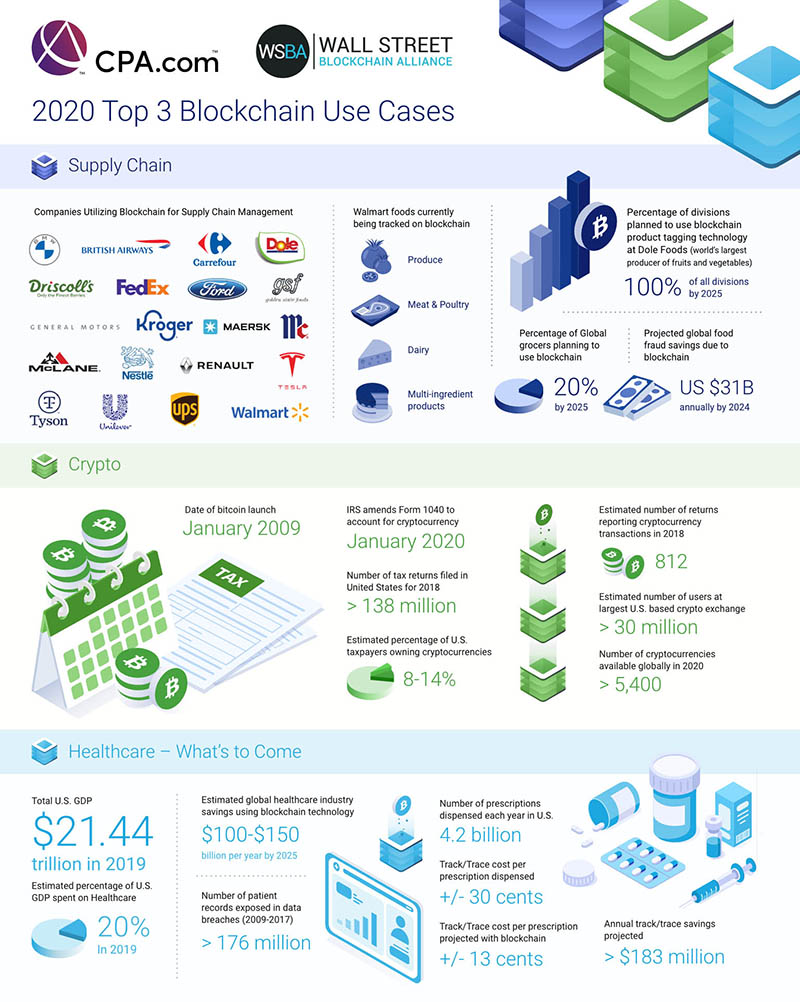Blockchain technology has exploded into the FinTech ecosystem and various industries over the last few years, evolving well beyond the buzz of Bitcoin. Already incorporated into a range of business and financial applications, its impact and use cases continue to improve as the technology matures.
For most industries, blockchain presents opportunities around increased transparency, efficiency, and innovation. At its core, blockchain is an accounting technology, an immutable ledger that tracks the transfer of ownership of assets; and as such, it’s poised to play a significant role in audit, tax, cybersecurity, accounting, and advisory services.
Each year, the AICPA and CPA.com host in partnership with the WSBA a Blockchain in Accountancy Symposium where some of the profession’s brightest minds and blockchain experts convene to explore strategize on how the community as a whole should think about, plan for and respond to the blockchain wave. In December, we published a special report, 2019 Blockchain Symposium: Experts’ Insights Indicate Growing Use Cases and Value for the Technology. Due to the technology evolving and maturing at an exponential rate, we decided to take a look at the most prevalent use cases for a mid-year update.
As more enterprises use blockchain technology, they will require practitioners who not only understand its implications but can provide broader guidance on how it will impact their businesses and industries moving forward. “Even though they are still uncertain of the impact blockchain will have on their businesses, 60% of CIOs in the Gartner 2019 CIO Agenda Survey said that they expected some level of adoption of blockchain technologies in the next three years” said David Furlonger, research vice-president at Gartner. “However, the existing digital infrastructure of organizations and the lack of clear blockchain governance are limiting CIOs from getting full value with blockchain.”
The technology is evolving at a rapid pace, which is why a mid-year update on some key use cases is important.
Supply Chain
Supply chains contain complex networks consisting of multiple stakeholders that have lots of touch points through a bill of sale. This creates a perfect use case for blockchain to drive cost-savings down while providing previously unattainable traceability. A centralized infrastructure that delivers greater visibility into the process and transfer of goods for high risk products like leafy green vegetables and beef, to high value goods like cars is only going to increase in the coming years. It may have started with an E Coli outbreak that wiped store shelves clean, but it is expanding to every corner of commerce including wine and consumer shipments.
Walmart created a food traceability mandate, which aims to prevent food-borne illnesses by identifying the source of contaminated products quickly. The food giant’s announcement is part of a larger trend: the digitization and movement of data, such as goods and services, intellectual property, credentialing, and trademarks, onto the blockchain. Most supply chains are tailor-made for blockchain, because the technology can be used to create transparent, immutable records.
Crypto
Despite the potential of its underlying technology, blockchain for many people is still synonymous with Bitcoin and the cryptocurrency’s spectacular rise in value. There are however over 5,400 cryptocurrencies available globally today and that number is only expected to grow. Mainstream payment processors PayPal and Venmo recently through their hat into the crypto buying and selling ring, which could trigger adoption by a large percentage of their 325 million users that previously have not transacted on a blockchain network.
Robert Materazzi, co-CEO, LukkaTax - "As all businesses across all industries embrace blockchain, crypto offers an enormous opportunity to learn how to manage blockchain data as use-cases are adopted in other industries, particularly as it relates to governance, risk, and audit frameworks."
Health Care
In our looking ahead to what’s the next big industry that will be transformed by blockchain, we evaluate the health care system – both patient records as well as prescriptions dispensed.
“Blockchain technology continues to evolve and become a strategic solution for a growing number of industries. The global healthcare industry is beginning to look to blockchain to help solve some of the entrenched problems of cost, privacy and inefficiency that have plagued healthcare for generations,” explained Ron Quaranta, chairman of the Wall Street Blockchain Alliance. “From patient records to prescription tracking, to pandemic monitoring, and more, we can expect blockchain technology to be a core part of how the global healthcare industry evolves in the future.”
In an important way, blockchain’s maturation aligns with the profession’s shift from recordkeepers to advisors. This transition is by no means limited to accounting and finance; as automation grows more sophisticated, professionals including lawyers, doctors, and insurance providers are relying more on personal, advisory-style relationships with clients and/or patients, hence the shift in multiple use cases to a more sophisticated technology platform.


